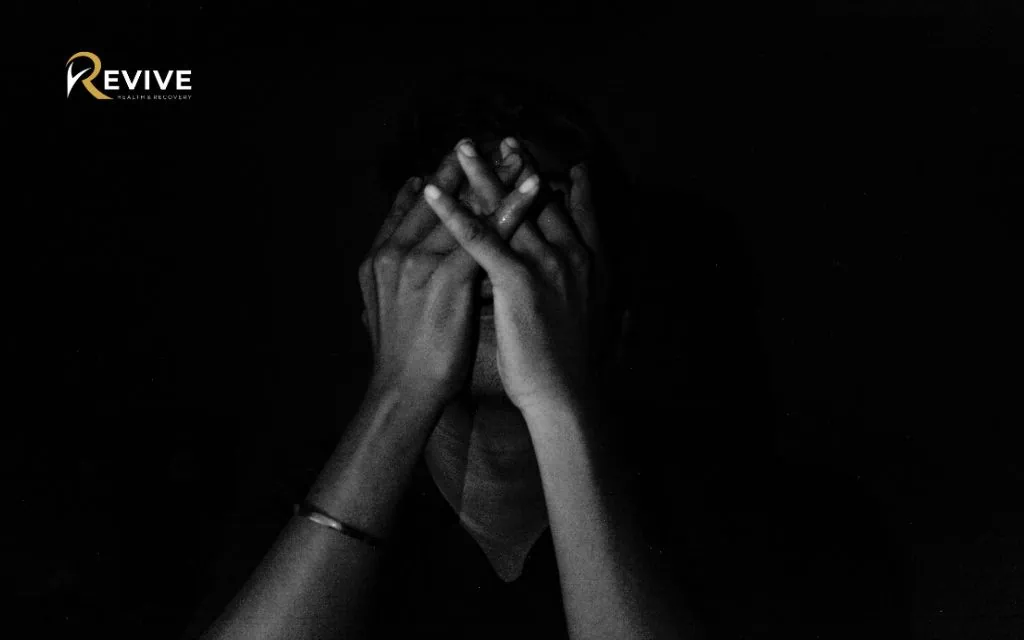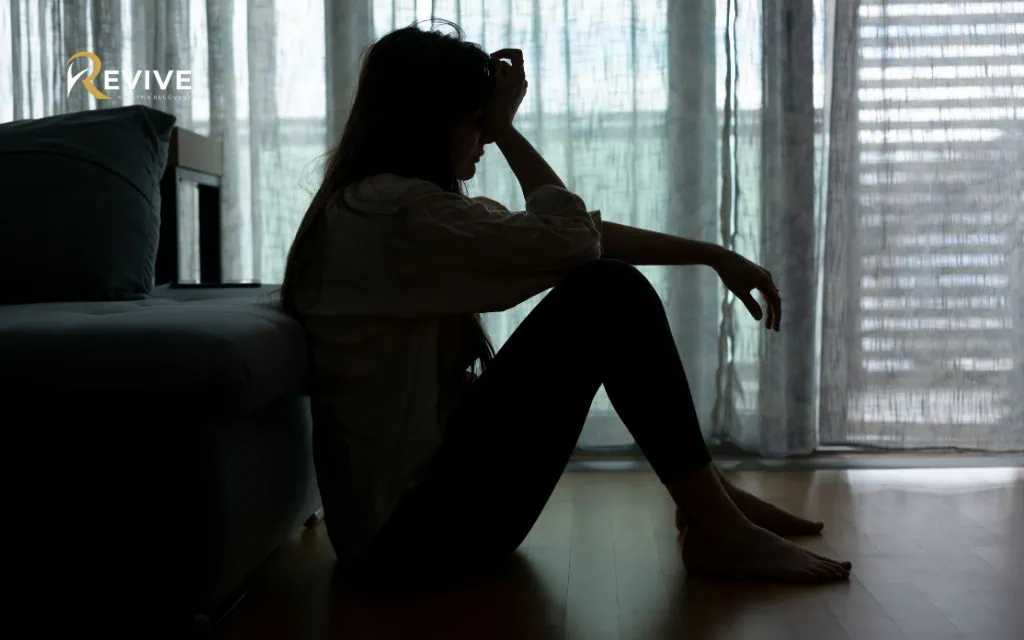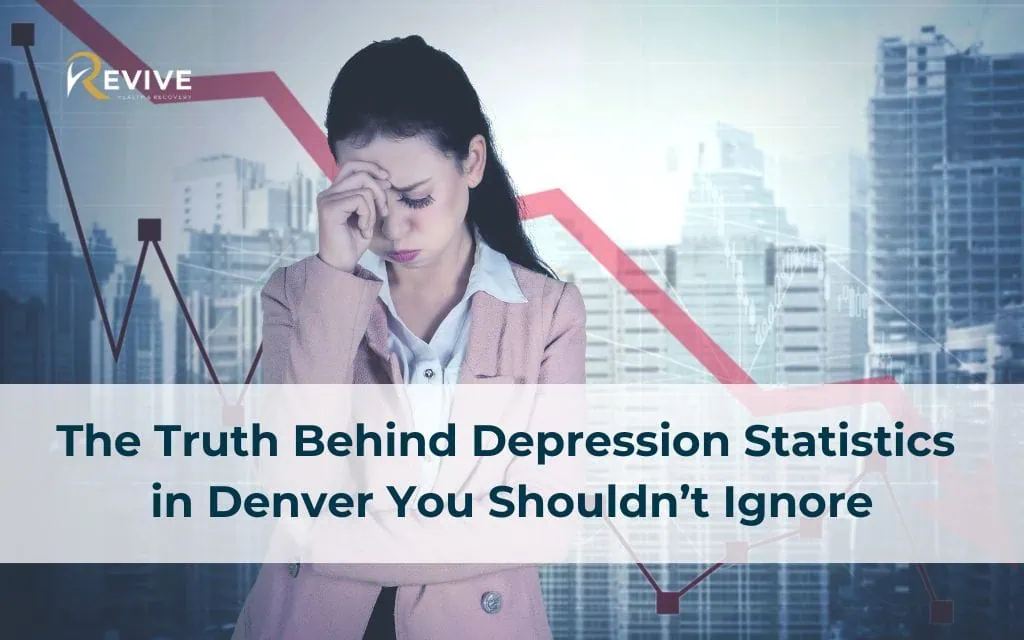Depression affects one in eight Denver residents, significantly impacting our community. According to recent studies by Denver Public Health, this invisible public health issue is far more widespread than many realize. This article dives deep into current data on depression prevalence across Denver, explores how it varies by neighborhood and demographic group, and examines post-COVID trends. Understanding these Depression statistics Denver is crucial for identifying needs and tailoring effective treatment solutions.
At Revive Health Recovery, we believe knowledge is the first step toward healing – both personally and as a community. Whether you’re seeking help for yourself, a loved one for managing the blues, or simply want to better understand this growing mental health challenge in Denver, this article offers a comprehensive and compassionate overview.
The Scope of Depression in Denver – Key Statistics & Trends
General Prevalence of Depression in Denver’s Population
Depression affects approximately one in eight Denver residents – about 76,100 people – according to recent data from the Public Health Institute at Denver Health. This rate places Denver slightly above the national average and reflects a concerning trend in our city’s mental wellness landscape.
When compared to other major metropolitan areas, Denver shows higher rates of depression and psychological distress. Colorado as a whole ranks among the worst states for adult mental health according to Mental Health America, with Denver mirroring these troubling statistics.
Over the past five years, we’ve observed a steady increase in depression rates across the city, with a sharp uptick following the COVID-19 pandemic. This trend demands our attention as mental health professionals and community members alike.
Depression Across the Life Cycle in Denver
Depression affects Denverites of all ages, though the impact varies significantly across different life stages:
Youth depression rates are particularly alarming, with approximately 30% of school-aged youth in Denver reporting symptoms of depression. This represents a significant public health concern for our community’s future.
Among adults, about 15% report experiencing poor mental health, with the highest rates occurring among those aged 25-44. These are often individuals juggling career development, family responsibilities, and financial pressures.
Elderly populations in Denver face unique challenges, with isolation and chronic health conditions contributing to depression. Approximately 12% of Denver seniors report depression symptoms, though healthcare professionals believe this number is significantly underreported.
Perinatal depression affects between 14-23% of Denver women during pregnancy, with approximately 9% experiencing postpartum depression. These mothers need specialized support during this vulnerable time.

Geographic Variations in Depression Rates
Breakdown by Neighborhood and Zip Code
Depression doesn’t affect all areas of Denver equally. Data from CHORDS (Colorado Health Observation Regional Data Service) reveals significant variations in depression rates across Denver’s neighborhoods:
When mapping depression by census tract, we find that certain areas experience rates of 15% or higher among adults – well above the city average. These high-prevalence zones tend to cluster in specific regions of the city.
Neighborhoods with limited access to green spaces, fewer community resources, and higher poverty rates consistently show elevated depression statistics Denver. This geographic disparity highlights the critical relationship between environment and mental health.
Neighborhood Environment and Mental Health
A neighborhood’s quality directly impacts residents’ mental wellness. Denver communities with safe parks, walkable streets, and strong social connections report lower rates of depression and anxiety.
Access to green spaces proves particularly important – research from Denver Public Health shows that residents living within a 10-minute walk of parks report better mental health outcomes than those without nearby natural areas.
Several local initiatives are working to address these disparities. Community-based mental health improvement programs focus on building neighborhood support networks and increasing access to resources in underserved areas.
Demographic Disparities in Denver’s Depression Rates
Gender and Sexual Orientation Differences
Depression rates in Denver show significant variations across gender and sexual orientation:
Among adults, women report depression at higher rates (17%) than men (14%), reflecting nationwide patterns. However, mental health experts at Denver Health note that men are less likely to seek help, potentially leading to underdiagnosis.
The disparity becomes even more pronounced among LGBTQ+ youth, with 58% reporting depression symptoms compared to 26% of their heterosexual peers. This alarming statistic highlights the urgent need for targeted support for these vulnerable young people.
Contributing factors to these disparities include societal stigma, discrimination, and lack of specialized care options that address unique needs of these populations.
Racial and Ethnic Variations
Denver’s mental health landscape reveals troubling disparities across racial and ethnic groups:
Non-Hispanic Black residents experience depression at significantly higher rates (26%) compared to non-Hispanic White (14%) and Hispanic (15%) residents, according to Colorado Department of Public Health & Environment data.
These disparities reflect broader health inequities rooted in systemic factors including economic opportunity, healthcare access, and experiences of discrimination and trauma.
Community-based organizations throughout Denver are working to develop culturally responsive mental health services to address these gaps, but significant challenges remain in providing equitable mental health care.
COVID-19’s Impact on Mental Health in Denver
Post-Pandemic Depression Trends
The COVID-19 pandemic created unprecedented challenges for mental health in Denver:
Local mental health providers reported a surge in depression and anxiety symptoms, with many residents experiencing symptoms for the first time. Denver saw approximately a 25% increase in reported mental health symptoms, mirroring global trends.
Particularly vulnerable groups included frontline healthcare workers, parents of young children, and those who experienced job loss or financial hardship during the pandemic.
Long COVID has emerged as an ongoing challenge in Denver, with studies indicating that up to 30% of those affected experience depression or anxiety as part of their symptom complex.
Adapting Mental Health Services Post-Pandemic
Denver’s mental health care system underwent rapid transformation in response to pandemic challenges:
Telehealth services expanded dramatically, with many providers, including Revive Health Recovery, now offering virtual options that remove transportation barriers and increase accessibility.
Digital mental health tools and applications gained popularity, providing supplementary support between therapy sessions and during times when in-person care wasn’t available.
These adaptations have created valuable lessons for future mental health care delivery in Denver, suggesting a hybrid model that combines in-person and virtual care may best serve diverse community needs.

Barriers to Mental Health Care Access in Denver
Challenges Reported by Denver Residents
Despite the high prevalence of depression, many Denver residents face significant obstacles when seeking help:
Financial concerns prevent approximately 65% of Denverites needing mental health care from accessing services. Treatment costs remain a major barrier despite insurance parity laws.
Lack of insurance coverage is particularly problematic—85% of uninsured individuals reporting depression symptoms didn’t seek care due to coverage concerns.
Mental health stigma continues to discourage many from seeking help, with cultural factors often amplifying this barrier in certain communities.
Long wait times frustrate those who do seek care, with 34% reporting they couldn’t get an appointment within a reasonable timeframe.
Vulnerable Populations in Denver
Certain groups face disproportionate challenges in accessing depression care:
Men compose 76% of suicide deaths in Denver yet are significantly underdiagnosed with depression, reflecting powerful stigma around male mental health.
LGBTQ+ community members often struggle to find providers knowledgeable about their specific needs and concerns.
Justice-involved individuals face particular challenges, with approximately 25% experiencing severe mental illness but limited access to consistent care.
Homeless and immigrant populations encounter compounded barriers including documentation requirements, language differences, and unstable living conditions that complicate treatment access and continuity.
Treatment Resources & Solutions in Denver
Integrated Care Approaches in the City
Denver is developing innovative approaches to address depression through integrated care models:
Denver Health and other major providers now offer collaborative care programs that coordinate primary care, behavioral health, and social services—creating more effective treatment pathways.
The benefits of whole-person care are becoming increasingly apparent, with integrated approaches showing improved outcomes compared to fragmented services.
While availability varies across the city, integrated services are expanding to reach more neighborhoods and communities previously lacking comprehensive care options.
Community Resources & Treatment Options
Denver offers diverse resources for those experiencing depression:
Public mental health services through Denver’s community mental health centers provide options for those with limited resources.
Peer support groups create valuable community connections, with over 50 depression-focused groups meeting regularly throughout the city.
Local prevention campaigns work to reduce stigma and encourage early intervention, including school-based programs targeting youth depression.

FAQs About Depression statistics Denver
Which Denver neighborhoods have the highest depression rates?
CHORDS data shows that certain Denver census tracts report depression rates exceeding 15% among adults, although variation exists citywide. Revive Health Recovery provides accessible care regardless of your neighborhood.
How do Denver’s depression rates compare to Colorado and the U.S.?
Colorado ranks among the worst states for adult mental health. Denver mirrors this with around 12% of residents reporting poor mental health. Revive Health Recovery specializes in addressing these concerning local trends.
What depression treatments are covered by insurance in Denver?
Coverage varies, but many options exist – from outpatient therapy to intensive programs. Revive Health Recovery works with several insurers to ensure accessible care. Contact us to verify your coverage.
How did COVID-19 affect depression rates in Denver?
Studies report a sharp increase in depression and anxiety symptoms post-pandemic, with a global rise of about 25%, a trend seen in Denver too. Our team at Revive Health Recovery has developed specific protocols to address pandemic-related mental health challenges.
What resources exist for teens with depression in Denver?
Denver provides several youth-focused programs, including school services, community clinics, and specialized care from Revive Health Recovery. Our adolescent depression treatment programs address the unique needs of young people.
Why Choose Revive Health Recovery for Depression Treatment
Our Specialized Depression Care Approach
At Revive Health Recovery, we understand Denver’s unique mental health challenges and have developed specialized approaches to address depression effectively:
We create personalized, evidence-based treatment plans that consider your individual circumstances, preferences, and goals. Our team recognizes that depression manifests differently for each person and requires tailored care.
Our multidisciplinary team includes psychiatrists, psychologists, licensed therapists, and wellness specialists who collaborate to provide comprehensive support addressing all aspects of depression.
We embrace a holistic philosophy that considers physical health, social connections, spiritual wellbeing, and psychological factors to create lasting recovery solutions.
5 Reasons to Trust Revive Health Recovery
- Personalized, science-backed care: We combine proven therapeutic approaches with individualized treatment plans designed specifically for your needs.
- Dual-diagnosis treatment expertise: We effectively address depression that co-occurs with substance use or other mental health conditions—a common scenario requiring specialized care.
- Welcoming environment with full confidentiality: Our Denver facility provides a safe, judgment-free space where you can speak openly without fear.
- Mind-body integrated approach: We incorporate physical wellness practices alongside traditional therapy to enhance recovery outcomes.
- Convenient location and flexible hours: Located at 1427 S Federal Blvd in Denver, we offer appointment times that accommodate busy schedules.
Conclusion & Call to Action
Depression affects a significant portion of Denver’s population, with wide disparities across neighborhoods, age groups, and demographics. By understanding the data, we can better direct care and support. At Revive Health Recovery, we’re committed to turning those challenges into healing.
If you or someone you love is battling depression, know that you’re not alone. Our Denver professionals caring Mood Therapy Team are ready to provide the personalized support you need to find balance and wellness again. Contact us today and take your first step toward recovery.
📍 Address: 1427 S Federal Blvd, Denver, CO 80219
📧 Email: contact@revivehealthrecovery.com
📞 Phone (24/7): (303) 268-4655



